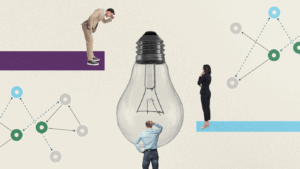
The Network Effect is our video series that brings you inside conversations with our cybersecurity and engineering executive network. In this episode, we feature Kent Wills, Director of Engineering at Yelp, who shares what it’s like to go from leading developer productivity to driving consumer-facing products, and what every founder can learn about building teams, infrastructure, and momentum that scales.
When to Prioritize Developer Productivity
Kent spent over a decade leading internal tools and developer experience at Yelp, and one of his clearest lessons is that timing matters. He warns early-stage startups not to over-invest in perfection too soon. When founders are still trying to find product-market fit, perfecting your codebase often solves the wrong problem.
Key Takeaways:
- Prioritize speed over polish until product-market fit is proven
- Avoid building internal infrastructure teams too early—it can create distractions
- Once scale hits, invest in hygiene and tooling to avoid burnout and bottlenecks
Process Doesn’t Scale, But Code Does
Kent shares how Yelp scaled code quality without micromanagement by embedding automation into their tooling and workflows. The team built tools like pre-commit that automatically applied internal coding standards before code hit production. If engineering leaders rely on process and policy alone, it won’t scale; they need your code to enforce the rules.
Key Takeaways:
- Create internal tooling to enforce style guide across teams
- Used automation to replace repetitive mentorship and reduce review bottlenecks
- Free up senior engineers to focus on high-leverage work instead of code review
Leadership’s Role in Developer Productivity
Kent transitioned from IC to manager to group leader and saw firsthand how critical leadership is in championing dev productivity efforts. He believes that product work is easy to connect to revenue. Infrastructure work isn’t, and without advocates, it gets deprioritized.
Key Takeaways:
- Engineers often know where the problems are, so listen to their feedback early
- You don’t need a dedicated productivity team at first, but you do need someone pushing for long-term improvements
- Leaders must balance short-term feature pressure with long-term stability
A Look Ahead: Automating the Costliest Work
One of the biggest pain points Kent sees in large organizations is code migrations. At Yelp, a single infrastructure update added up to four years of collective developer time. He argues that the future of dev productivity is automating migration work so your best engineers don’t spend months doing repetitive tasks.
Key Takeaways:
- Large migrations often get delayed due to team bandwidth and priority conflicts
- Codegen tools and assistive AI could transform this from a years-long effort into something far faster
- We still require engineering experts to define what matters
Advice for Startups: Use Your Investor Network Strategically
Kent has worked closely with the Next47 executive network and sees it as a two-way amplifier: it gives, and it saves. If founders are struggling with a scaling or product challenge, there’s probably someone in this network who’s already solved it.
Key Takeaways:
- Don’t wait for intros. Proactively share your challenges with your investor’s network team
- Leverage VCs as connectors to experienced operators who’ve already been there
- Save time and avoid common pitfalls by getting real-world advice early





